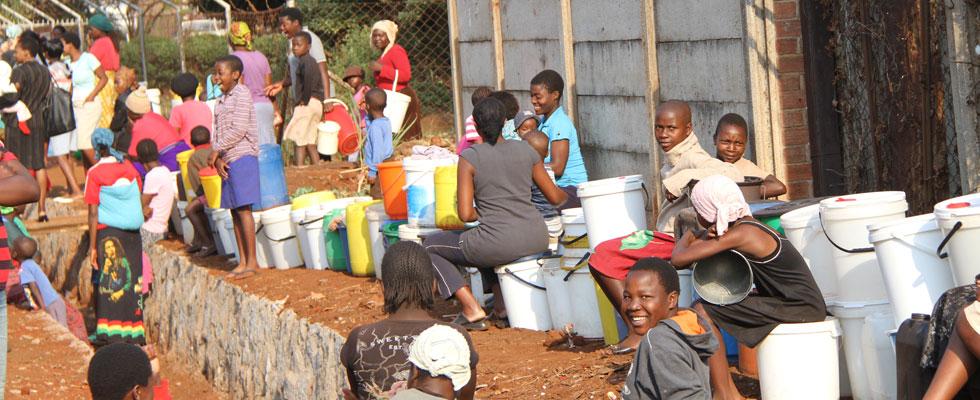
A South African company has offered to replace and upgrade the ageing Harare water distribution network at a cost of US$100 million.
BY PATRICE MAKOVA
The development comes at a time when the city is seeking nearly US$3 billion to implement a comprehensive Water Services Delivery Plan which is aimed at providing a lasting solution to the water problems in the Harare Metropolitan area.
Harare is currently failing to supply adequate water to residents, resulting in frequent outbreaks of water-borne diseases as people resort to unsafe water sources.
The city says it loses about 220 mega litres of treated water and US$114 000 in revenue per day. Underground leakages and regular trenching to repair water-pipe bursts have also caused an extensive damage to the road network.
Mayor, Bernard Manyenyeni said the South African company was offering to replace and upgrade the water distribution network at no cost to the City of Harare.
He said in return, the company would lay broadband fibre optic infrastructure alongside the newly laid water distribution pipes. “The deal is still under consideration and discussions are going on,” said Manyenyeni.
But sources at Town House said negotiations between the two parties started in January last year and were concluded last November. A senior council official said the deal was now awaiting Cabinet approval.
- Chamisa under fire over US$120K donation
- Mavhunga puts DeMbare into Chibuku quarterfinals
- Pension funds bet on Cabora Bassa oilfields
- Councils defy govt fire tender directive
Keep Reading
The deal would complement the on-going US$144 million Chinese project for the upgrading of water works at Morton Jeffrey.
Documents in possession of The Standard show that Cressham Investments of South Africa was proposing to replace 1 000 km of the aged water pipe network, install pressure reducing valves, network valves and property connections.
The company would at the same time introduce broadband communication services through the utilisation of the same civil works and servitudes required to lay the water pipes and the fibre optics.
“This is very important as the water network upgrade and the fibre optics go to each consumer, enabling individual connectivity,” reads the council document.
Under the proposed deal, council would not seek new capital for the water network upgrading as this would be paid off by the broadband communication business.
On the other hand, the South African company would benefit from reduced cost of civil works estimated at 80% of the fibre optics infrastructure and recoup investment cost in pipe replacement through a broadband business.
Harare provides water to four million people in the city, Chitungwiza, Ruwa and Norton.
Under its proposed Water Services Delivery Plan, the city intends to overhaul and expand its entire water services delivery system with a view to providing constant supplies of water to at least 80% of residents by 2020.
According to the council documents, the implementation of the plan entails the upgrading of existing water and wastewater systems, implementation of a reliable revenue management system, and construction of two new dams with corresponding treatment plants to double the current capacity to 1 450 mega litres per day.
The plan would also see the construction of a new water distribution infrastructure and waste water system and four hydroelectric plants with a total capacity of 60 MW of energy.
Council said deferment of the project could result in the complete collapse of the water services within the city as well as the escalation of costs by at least 30%.
To raise the US$2,95 billion required to implement the project, council was proposing partnering with international companies to leverage finance and expertise, as well as developing other sustainable institutional models and funding solutions.
What broadband would mean for Harare residents
Harare City Council said broadband investment would result in high-speed internet connectivity to all residents of Harare, as well as termination services to fixed line and mobile operators. It said installation of the 4G broadband communication network would position Harare as a global ICT hub, opening new economies such as business process outsourcing and data centres. “The installation and commissioning of high-speed broadband will transform Harare into a smart city and major communication hub,” reads the Council document. “With Zimbabwe’s highly educated skills base and being in the same time zone as most of the Western countries, this will enable Zimbabwe to aggressively compete with such countries as India and Cambodia for business outsourcing services.” Council said large businesses would no longer have to invest in broadband as this would become a municipal service just like the provision of water. It said the provision of broadband would enable the city to enact by-laws against excavation for the installation of wired broadband since the service would be readily available. Council said the provision of fibre-optic broadband service would also enable the city to have real-time management of the water and roads infrastructure using telemetry. “Telemetry will reveal traffic bottlenecks as traffic signals will be programmed to allow a smooth flow of traffic,” it said. “Water reservoirs and water plants will be operated from a central point, allowing the re-channelling of water to the neediest areas. It will also enable monitoring of service delivery assets, thereby minimising misuse of the same.” Harare is expected to assume total ownership of the broadband infrastructure after 25 years.











